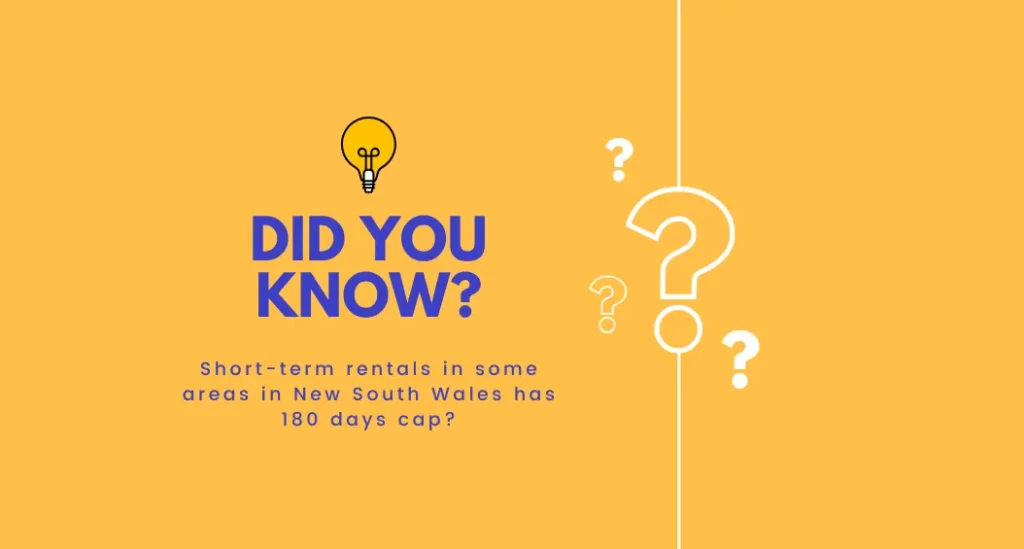Within New South Wales, the state government has implemented short-term regulations. This includes registering your property on the short-term rental accommodations (STRAs) register, ensuring the
accommodation is up to fire regulations standards, and in certain parts of the state, imposing a 180-day cap.
What is a hosted and non-hosted property?
Hosted properties the host must reside on the premises during the period of the guest staying in the accommodation. There are no day restrictions on this hosting type. Non-hosted is when the host is not present while the guest is staying at the accommodation. This has a 180-day cap.
What does the 180-day cap mean?
Non-hosted property can only be rented via short-term rentals for a maximum of 180 days per year. The majority of investment properties will be non-hosted therefore the cap will apply. However, when you think of 180 days this is almost 50% of the year which would be an average of 3.5 days a week, which is still a fair amount and your property if in the right location with the right qualities can still make more money using this strategy than long term rentals. Reach out and we can analyse your property.
Where in NSW does the 180-day cap apply?
‣ Greater Sydney region (not including the Central Coast)
‣ Ballina local government area
‣ Bega Valley local government area
‣ Byron local government area
‣ Dubbo Regional local government area
‣ City of Newcastle local government area
‣ Specified land in the Clarence Valley local government area
‣ Specified land in the Muswellbrook local government area
Tips for hosts on how to manage the 180-day cap:
‣ The number of days that your property is booked for short-term rental each year should be kept track of, however, the NSW Planning portal will also have a tally.
‣ Stay informed about the various exemptions to the cap so that you can utilise them if necessary
‣ Encourage longer bookings by offering discounts. This strategy can effectively attract guests who prefer to stay for 21 or more consecutive days, exempt from the cap. This approach not only boosts your occupancy but also ensures compliance with the regulation.
What else do the regulations cover?
The regulations also cover:
‣ Fire safety, such as evacuation plans, fire extinguishers, fire blankets and smoke detectors.
‣ Notifying neighbours and building management (if applicable)
‣ Ensuring the guest has the information needed to deal with emergencies.
‣ Ensuring the guests know to be respectful to the neighbours and the neighbourhood.
‣ Ensuring the host has suitable insurance to cover guests and the property.
‣ An Exclusion Register of guests and hosts who have not complied with the regulations.
As a recap
‣ The cap only affects non-hosted Short-Term Rentals (STRAs), where the property owner is not present while guests stay.
‣ It applies to specific areas, including Greater Sydney (excluding the Central Coast), Ballina, Bega Valley, Byron, Dubbo Regional, Newcastle, certain land in the Clarence Valley, and certain land in Muswellbrook.
‣ Some exceptions to the cap include bookings lasting 21 or more consecutive days by the same guest and STRA’s hosted by the property owner
‣ You need to register your property as an STRA with NSW Planning
‣ Additionally, it is essential to follow all applicable laws and regulations, including fire safety standards and notifying neighbours
More information can be found on NSW Planning and if you have any uncertainties regarding how the regulations affect your property, we are here to help, just reach out.

